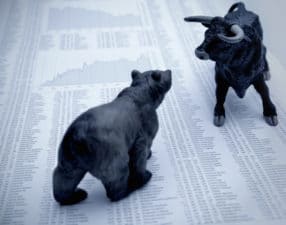“Don’t be fooled by the recent rebound in stocks; the investment scene is beginning to resemble the 1929 market crash and the early 1930s Great Depression.”
These were the words spoken by A. Gary Shilling, the president of A. Gary Shilling & Co., and a leading economist as he spoke to Bloomberg News.
Canadian investors have recently been enjoying some relief with a market rally that has seen the recovery in several sectors of the economy. However, Shilling predicts that this is a precursor to a possible 30% to 40% drop in stocks that can stretch into 2021.
History repeating itself
In his piece for Bloomberg, Shilling pointed out that there was a 48% plunge in the Dow Jones Industrial Average Index between September and November 1929. The pullback looked like a reasonable correction. Investors pushed stocks up by 48% through April 19390. The Dow ultimately shed 80% from its peak in September 1929.
He fears that history may be repeating itself with the current market situation. Most investors and economists are hoping for a V-shaped rebound in the market for a better second half in 2020. Shilling remains skeptical regardless of the stimulus packages being provided by the government.
Shilling believes that the total decline in wealth will have a substantial impact on consumer spending throughout the world. The pandemic will certainly have with long-lasting consequences.
Safety is the name of the game
We’re just halfway through 2020 and it’s already been the most challenging year we’ve seen in recent times. From the Amazon being on fire, to a pandemic, and a global movement after severe civil rights issues in the U.S., it seems like the difficulties will keep mounting this year.
It is imperative to play it safe during this financial crisis. There are two ways you can accomplish keeping your capital safe amid such uncertainty. The first thing you can do is hold on to cash. Unfortunately, cash can suffer dramatically. It can’t earn any interest and it’s a decaying asset that will suffer due to inflation.
The second thing you can do is purchase inflation-protected assets like gold, or you can buy stocks. If you choose to buy stocks, you must purchase shares of companies that can keep earning during a recession.
Recession-resistant stocks
No matter how bad things can become, food is one of the things we need to remain healthy and safe during a global health crisis and otherwise. To this end, grocery stores are faring far better than most other businesses.
Owning the shares of a company like Loblaw Co. Inc. (TSX:L) can work out well for investors who want to purchase stocks to protect their capital.
Trading for $67.09 per share at writing, the stock is paying its shareholders at a modest 1.88% dividend yield. The leading multi-category Canadian retailer has remained relatively unscathed during the broad sell-off in the stock market. Loblaw is benefitting from changing consumer behaviour as more people purchase goods from the store online and rely on making larger purchases in each visit to the physical stores.
Another safe investment could be Waste Connections Inc. (TSX:WCN)(NYSE:WCN). While many people might not make much of it, Waste Connections provides an essential service to its customers across North America. It provides waste-related services, generating 85% of its revenue through integrated waste services in the U.S.
In the last five years, the company consistently increased its income. The company has a non-cyclical nature that can continue to generate stable income through the worst recessions. It is and shall remain an essential service. The stock is trading for $126.44 per share and pays shareholders at a0.82% dividend yield.
Foolish takeaway
With the chances of Market Crash 2.0 increasingly likely throughout the world, it is imperative to safeguard your capital through these challenging times.
Creating an investment portfolio of recession-resistant stocks that can earn an income for you can help you protect your funds and use it to earn income to keep pace with inflation.
To this end, I think Waste Connections and Loblaw could be excellent assets to consider.








